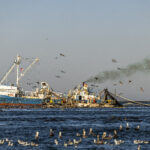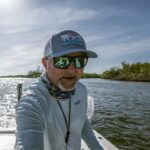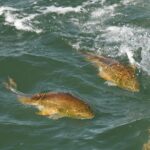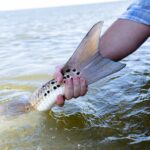
Gulf Menhaden Reduction Fishery: Bycatch Research & Useless Buffer Zones
Do you remember your driver’s test? How nervous were you when the instructor pulled out
Feature Photo: A school of menhaden captured by Tim Regan
Menhaden advocates from across the country tuned into today’s ASMFC Menhaden Board meeting. At one point, there were 163 people logged into the webinar. Why was this meeting so well attended? Because of a vague statement listed as the final agenda item:
“Discuss Possible Chesapeake Bay Management (L. Fegley) Possible Action.”
As the meeting progressed, there was a motion made by Maryland to have time and spatial closures for the reduction fishery inside the Chesapeake. Now, you know as well as we do that Maryland is not exactly a bastion of conservation. So, where could this be coming from? It didn’t take long to figure out. Pound net fishermen are not catching any menhaden in Maryland.
In conjunction with this motion, USGS did a fantastic presentation on the status of the osprey population in the Chesapeake. In the nutshell, a lot can impact osprey chick survival. One of the factors is food. That food is dependent upon where the osprey nest exists. Menhaden are not always the primary food source.


The bottom line with the study is that many osprey nests are failing throughout the bay. While the menhaden harvest might not be the only cause, it is certainly one of the main factors. Based on this information, Maryland moved forward with the following motion:

There was a great deal of discussion around this issue. The commissioners that spoke in favor of the motion were the maker of the motion, Lynn Fegley, seconder, Mr Lefrance, Abbott (NH), Colden (MD), Dize (MD). Several commissioners spoke against this motion. Mrs. Fegley’s motion was challenged to move to October and then challenged again to postpone indefinitely.

Both the counter motions failed to get the necessary votes.
Then, Ms. Colden (MD) put forth a commonsense motion. That ultimately passed unanimously with only Rhode Island submitting a null vote.

Ms. Colden spoke very well in support of her motion. She stated that there is a lot that we don’t know, and ERP’s will not address possible bay depletion anytime soon. As the bay is changing, so are predator demands. Concentrated harvest is a serious concern and predator needs will increase as we rebuild overfished stocks like striped bass. Here’s the takeaway from this meeting:
Before today, we had little hope of anything changing in the Chesapeake. Today, we have movement and from that movement there is hope again. A workgroup for menhaden is the correct path forward. All of us can work together to understand the impacts of removing hundreds of millions of fish per year from such a concentrated area. We can get a better grasp on bycatch. We can finally make some headway on an issue that is incredibly important to everyone in the Mid-Atlantic and North East.
On the downside, it is hard not to feel like the operating costs for the reduction fleet are more important than the resource, Maryland menhaden fishermen, osprey, predatory fish, and recreational fishermen. But let’s not focus on that for now. We have a path forward to drive real change.
Our menhaden advocacy will center around support for the workgroup as well as science to drive precautionary management for forage species that are critical to our coastal ecosystem. Our team is excited for the opportunity. We will work to educate our community about the best available science and amplify every opportunity to engage in the future of menhaden management.

Do you remember your driver’s test? How nervous were you when the instructor pulled out

If you’ve spent any time on the water in South Florida, chances are you’ve heard

Photo Credit: Graham Tayloe Big Win for Redfish in Alabama Huge news from the Marine

Feature Photo: Carter Abramson | Simms Fishing at the Fisheries Science Symposium We have more
We rely on our members and donations to keep fighting for a sustainable tomorrow in marine conservation.
GIVE THE GIFT OF FISHERIES CONSERVATION THIS HOLIDAY SEASON. SHOP ASGA GOODS THAT FUND FISHERIES RESEARCH & ADVOCACY CAMPAIGNS
JOIN ASGA IN CALLING FOR CRITICAL MANAGEMENT ACTION AFTER YEARS OF SPAWN FAILURES & POOR MANAGEMENT.
By using this website, you agree to our use of cookies. We use cookies to provide you with a great experience and to help our website run effectively. To learn more, please review our privacy policy.
One Response
A ban on factory fishing for Menhaden is a must! This is the most importantly fish in the ocean.